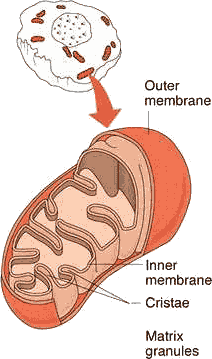|
Of all the women who have ever lived, there was one woman who was special. She was the common maternal ancestor of all women currently alive. She was "Mitochondrial Eve".
Consider the set of all women who have ever lived. Each had exactly one mother. Now shrink the set of all women to contain only mothers. Each of them had exactly one mother. Shrink the set again to contain only mothers of mothers. Again, each of these women had exactly one mother. Again, shrink the set to contain only mothers of mothers of mothers. Continue doing this until you have a set with exactly one woman. She is the maternal ancestor of all living women; she is Mitochondrial Eve.
We don't know much about ME. We do know that she had at least two daughters. If she didn't have any daughters she couldn't be ME, and if she had only one daughter then her daughter would be ME.
 The reason this woman is called Mitochondrial Eve is interesting and significant. Inside all living cells are structures called Mitochondria, which function as the "power sources" for the cell. Evolutionary biologists believe that mitochondria were originally separate organisms similar to bacteria, which were "captured" by cells long ago. Mitochondria have their own DNA, separate from the cells DNA. All animals inherit their mitochondria and their mitochondrial DNA solely from their mother. So Mitochondrial Eve is the sole ancestor to a long line of successful mitochondria, and her mitochondrial DNA (mtDNA) is found in all living humans. The reason this woman is called Mitochondrial Eve is interesting and significant. Inside all living cells are structures called Mitochondria, which function as the "power sources" for the cell. Evolutionary biologists believe that mitochondria were originally separate organisms similar to bacteria, which were "captured" by cells long ago. Mitochondria have their own DNA, separate from the cells DNA. All animals inherit their mitochondria and their mitochondrial DNA solely from their mother. So Mitochondrial Eve is the sole ancestor to a long line of successful mitochondria, and her mitochondrial DNA (mtDNA) is found in all living humans.
Interestingly, geneticists believe that ME lived as recently as 200,000 years ago, based on the observed variation in mitochondrial DNA found in present-day humans.
When ME was alive, she was almost certainly not "the ME". There would have been other women alive at the same time who would have had different female ancestors. It is only retrospectively, as a function of the women alive today, that ME is "the ME". Furthermore, in the future she may again no longer be "the ME"; the entire female line of one of her daughters may die off, leaving one of her daughters or granddaughters or great-granddaughters or ... with the title.
I find it fascinating that it is logically provable that ME existed. You may too, or you may be thinking "so what?" But aside from being an interesting concept, akin to "the tallest living man", what else about ME is interesting? Well, the fact that mtDNA is inherited solely from one parent makes it a simple and interesting way to track variations in human populations. It is both easier and more accurate than measuring variations in cell DNA. Assuming that mtDNA mutates with a relatively consistent rate, and given that all living humans had one common mtDNA ancestor (ME), then measuring the average difference between mtDNA samples taken from human populations is a good way to measure the "evolutionary distance" between them.
mtDNA does not necessarily mutate with the same frequency as cell DNA, in fact, most human geneticists feel it probably mutates far less frequently, both because it is genetically "old", and because it only reproduces by fission, leaving less opportunity for "crossing over". mtDNA therefore provides an interesting "fixed timeline" for comparing potential mutations and mutation rates in cell DNA.
I should mention that some have argued that mtDNA need not mutate with a relatively consistent rate, due to technical reasons involving the mechanisms of mitochondria formation within cells. If it doesn't it would make mtDNA variation less useful in genetic studies, but it would not mean there was no ME, contrary to arguments others have advanced.
Mitochondria are essential structures in cells, providing as they do the chemical machinery for generating energy. We can surmise that at one time there was tremendous selective pressure on mtDNA, leading to the present high peak in the valley of fitness. Because all living humans have a recent common ancestor, they all have similar mtDNA and similar mitochondrial function, and hence there is little selective pressure. There is evidence to suggest differences in mitochondria may result in differences in human aging. This would be an important finding if true, leading to much fruitful research, but would not affect selection in the slightest; what is important in selection is how many children you have and when you have them, not how long you live after you have them...
Other than satisfying the definition given above, what was special about ME? Well - nothing! She was in all likelihood an unremarkable woman, not especially different from her contemporaries in any significant way. Her coronation as ME owes as much to luck as to genetic fitness or any other factor. But just think how much the course of history would have changed had some accident befallen her! This is the butterfly effect in evolution :)
{By a similar argument, there was one man who was Y-chromosome Adam, the common male ancestor of all men who are alive today... It is astronomically unlikely that ME and YA were contemporaries, and even more unlikely that they knew each other or mated together.}
[ This post owes much to Daniel Dennett's classic book, Darwin's Dangerous Idea. ]
[ Later: this post attracted a bunch of interest - thank you! - and several people asked a key question: what species was ME? ]
| 



